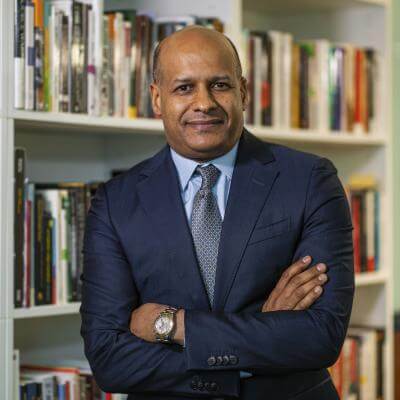The Privatisation of War
https://doi.org/10.71609/iheid-5ccq-t352“We are coming.”
These three very clear words are not announcing the sequel of the TV show Game of Thrones, but were published in December 2018 as a full-page ad in the print issue of Recoil Magazine by Blackwater USA, the infamous US private military and security company (PMSC). The company, which was renamed, sold, and began operating in 2011 as Virginia-based Academi, was mired in controversy after its employees shot at Iraqi civilians, in Nisour Square, Baghdad, killing 17, while escorting a US embassy convoy in 2007. Ten years after the incident, Erik Prince, the company’s founder, is now suggesting in recent interviews new strategies for replacing US troops with private military contractors in Afghanistan and in Syria, proposals which might not entirely fall on deaf ears in the current Trump administration.The aggregate economic and financial cost of conflict in 2014 was estimated to be USD 14.3 billion, or 13.4% of the global economy.
The private security and military industry has been booming since the end of the Cold War, especially in the context of the US-led military interventions in Afghanistan and Iraq following the 9/11 attacks. The biggest PMSC, the UK-based company G4S, which offers a broad range of security services, has reported a total revenue of EUR 3.7 billion for 2018. Another multinational security giant, DynCorp International, which benefits almost entirely from US government contracts, indicates a revenue exceeding EUR 2.6 billion.
Are these companies the new mercenaries of the 21st century?
Individuals selling their participation in war have always existed. Monarchs relied on “military entrepreneurs” to wage war at least since the mid-16th century. Despite the signing of the Treaty of Westphalia in 1648, which marked the consolidation of European states and the subsequent strengthening of state-controlled armies, European rulers continued to use mercenaries. In the United States, a large-scale use of contractors to support US military operations occurred during the Vietnam War. The end of the Cold War marked the proliferation of private military corporations and civilian contractors as the reduction of former Soviet and US forces left thousands of professional soldiers without a job, allowing PMSCs to fill the vacuum. During the conflicts in Afghanistan and Iraq in the early 2000s the ratio of US troops to private contractors was ten-to-one. Today, the industry is worth billions of dollars and the use of PMSCs by different actors, such as states but also international organisations and NGOs, seems here to stay.
PMSCs offer different kinds of services and not all of them actually involve combat functions. Private military corporations can fall into three types of categories: military providers, military consulting and military support. Only military provider firms engage in actual combat and in command and control operations. The US company AirScan, for example, provides military surveillance services, often directly in combat zones. Military consulting and support companies, which form the majority of PMSCs, offer strategic advice, weapons maintenance, intelligence gathering (such as the US firms CACI International or GK Sierra), military training, military interrogation or security services for high level officials. Often these companies are founded and staffed by former military. Blackwater (Academi) was founded by former US Navy SEAL Erik Prince, while the employees of the company Triple Canopy (Constellis) are often former special operations personnel, who join the business looking either for new work opportunities (as happened after the end of the Cold War) or for better paid jobs.
From a legal point of view, mercenaries should be distinguished from PMSCs. A mercenary is traditionally defined as one who accepts money or some benefits for military service. However, in a largely political movement against the West, a detailed definition of the term “mercenary” was negotiated in the context of the decolonisation movement and its regulation was introduced in the 1977 Protocol Additional to the 1949 Geneva Conventions (AP I, Article 47).
What are the risks and benefits of this privatisation of war?
PMSCs are commercial entities with clearly defined business structures, that compete on the global market to provide different types of security services in many contexts. Despite being commercially run enterprises, they often share the sulphurous reputation of mercenaries, as some PMSCs have been involved in serious violations of the law of war and human rights. Apart from the Nisour Square shooting mentioned above, two US-based corporations, CACI International and L-3 (formerly Titan Corporation), have allegedly been involved in the torture of Iraqi detainees at Abu Ghraib prison in Baghdad in 2003. Other problematic issues with PMSCs include their lack of transparency and their personal agendas, which may not match the one of the states which employ them. These facts prompted states to adopt a more robust regulation of PMCSs at the national and international levels, in particular the 2008 Montreux Document on Pertinent International Legal Obligations and Good Practices for States Related to Operations of Private Military and Security Companies during Armed Conflict and the 2010 International Code of Conduct for Private Security Service Providers.
It seems clear that governments will continue using PMSCs and their diverse range of services. It has been alleged that such services cost less than the state military, although this has been debated, and could help reduce the number of casualties of the “boots on the ground” – casualties being often a politically sensitive and unpopular issue for many governments. However, the impact of the use of PMSCs on the duration of conflict is contested. Research has shown that when such companies are used in combat operations to the benefit of one of the parties to the armed conflict, they tend to diminish the chances of a lasting peace. That being said, while the use of PMSCs has often been associated with serious violations of international law, one should not dismiss the fact that these companies can also play a positive role in some contexts. For example, G4S supported post-conflict development in South Sudan by removing explosive remnants of war. According to their website, apart from providing intelligence services to their client, CACI International also “supports nationwide initiatives to improve healthcare delivery systems, integrate electronic health records, enhance population health, and sharpen emergency responsiveness”. In any case, it is crucial that their action be carefully assessed and regulated by states and the international community.
Electronic reference
Bellal, Annyssa. “The Privatisation of War.” Global Challenges, no. 5, April 2019. URL: https://globalchallenges.ch/issue/5/the-privatisation-of-war. DOI: https://doi.org/10.71609/iheid-5ccq-t352.Examples of private military and security company (PMSCs)
Dominican Republic: Northbridge Services Group
Dubai, Hong Kong, Shanghai and Taiwan: Asia Security and Protection Group
Peru: Defion Internacional (no website)
Russian Federation: Wagner Group (no website)
United Kingdom: Aegis Defence Services, G4S, Control Risks, International Intelligence Limited
United States: Academi, AirScan, CACI International, Triple Canopy/Constellis, DynCorp, GK Sierra (no website)
Definition of a Mercenary
Article 47 of AP I deprives mercenaries from prisoner-of-war status and thus from legally participating in hostilities. In addition, it requires that a mercenary do not possess the nationality of a party to the conflict. As a consequence, irrespective of the fact that the protocol only applies to conflicts between states or situations of occupation (i.e. international armed conflicts), the provision could not be applied to private contractors from the US, the UK, Canada, Australia and other countries which have been involved as parties to the conflicts in Afghanistan and Iraq. The 1989 UN International Convention against the Recruitment, Use, Financing and Training of Mercenaries extends the definition of the mercenary, who may also be a non-national recruited to overthrow or undermine a government or the constitutional order of a state; in addition, it makes the recruitment, use, financing or training of a mercenary a crime under international law. This convention, however, has been ratified only by 36 states and its scope of application is very limited.
Montreux Document and Code of Conduct
The Montreux Document recalls the obligations of states under international humanitarian and human rights law when they hire PMSCs and encourages them to adopt adequate legislation and procedures for contracting PMSCs. Adopting a somewhat different perspective, the Code of Conduct is a multi-stakeholder initiative which includes PMCSs themselves and whereby they set out their own human rights responsibilities. As of today, 101 PMSCs from different countries have adopted the Code, among which Academi and G4S (Tanzania).
Map based on the data produced by the Small Arm Survey, and enriched by the Graduate Institute’s Research Office in Geneva, in collaboration with whybe.ch.
Migration, Violence and War, with Charles Heller
Graduate Institute – Research Office
State-Based Conflict since 1946
© ourworldindata.org / CC – Creative Commons
Source: Uppsala Conflict Data Program (UCDP)
Variable description: Ongoing conflicts are represented in each year in which more than 25 deaths occurred.
Violence, Killer Robots and Regulation, with Paola Gaeta
Graduate Institute – Research Office
Terminology Related to Violence and Conflict
The intentional use of physical force or power, threatened or actual, against oneself, another person, or against a group or community, that either results in or has a high likelihood of resulting in injury, death, psychological harm, maldevelopment, or deprivation.
The World Health Organization (WHO)
Derived from the Latin word conflictus, which means collision or clash. This term is understood as a disagreement between two or more parties through which the parties involved perceive a threat to their needs, interests or concerns. Source
A dispute involving the use of armed force between two or more parties, often referred to as war. Source
Militarised armed conflict between two or more states. Source
A conflict between a government and one or several non-governmental parties, often with interference or support from foreign actors.
The intentional use of illegitimate force (actual or threatened) with arms or explosives, against a person, group, community, or state that undermines people-centred security and/or sustainable development. Source
Violence that is directed against a person on the basis of gender or sex. It includes acts that inflict physical, mental, or sexual harm or suffering, threats of such acts, coercion, or other deprivations of liberty. While women, men, boys and girls can be victims of gender-based violence, because of their subordinate status, women and girls are the primary victims. Source
IHL distinguishes between Non-international armed conflict defined as “A conflict in which government forces are fighting with armed insurgents, or armed groups are fighting amongst themselves” and International armed conflict defined as “A war involving two or more States, regardless of whether a declaration of war has been made or whether the parties recognize that there is a state of war. Source
A criminal act or acts intended to inflict dramatic and deadly injury on civilians and to create an atmosphere of fear, generally in furtherance of a political or ideological (whether secular or religious) purpose. Terrorism is most often carried out by sub-national or transnational groups, but it has also been known to be practiced by rulers as an instrument of control. Source
Research Office












